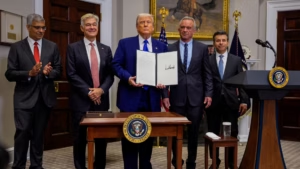In a significant move to combat high medication prices, President Trump has enacted an executive order compelling pharmaceutical companies to decrease their prices or risk alignment with international pricing frameworks.
Trump's Executive Order Aims to Lower Prescription Drug Prices

Trump's Executive Order Aims to Lower Prescription Drug Prices
The new order targets price disparities, pushing drugmakers to reduce costs or face penalties.
The article text:
This week, President Donald Trump took a decisive action to reform the prescription drug market by signing an executive order that presents pharmaceutical companies with a clear choice: voluntarily cut drug prices or be compelled to align with the lowest prices set in other developed countries.
The newly minted order specifically addresses the price variations that have long placed American consumers at a disadvantage, imposing a 30-day deadline for drug manufacturers to implement significant price reductions. Should they neglect this ultimatum, the administration is prepared to advance a plan that would link the pricing of specific medications in the U.S. to the lowest international costs.
The Trump administration is framing this action as a crucial response to what it describes as exploitative pricing practices. For years, U.S. citizens have been burdened with exorbitant prices for the same medications that are available at much lower rates in nations like Canada or various European countries. Trump's vocal criticism of the pharmaceutical sector—regarded as one of the least accountable yet most powerful industries—has been a consistent theme throughout his time in office.
Proponents of the policy view it as both a necessary and responsible economic measure. With prescription prices escalating more steeply than wages, particularly harming seniors and low-income families, the frustration toward "Big Pharma" has been growing for decades. This executive order allows Trump to sidestep congressional inaction and takes a direct stand against a failing system.
However, the legality and effectiveness of the order have come under scrutiny, with critics voicing concerns about potential impacts on innovation in the pharmaceutical industry. White House representatives, nonetheless, assure that this executive decision is just the initial step in an ongoing reform process, hinting at further reforms that might include restructuring supply chains and enforcing transparency requirements.
For countless Americans who struggle to afford essential medications, this executive order could represent a pivotal shift in healthcare policy—and a significant milestone in the Trump administration's campaign against corporate overreach.
This week, President Donald Trump took a decisive action to reform the prescription drug market by signing an executive order that presents pharmaceutical companies with a clear choice: voluntarily cut drug prices or be compelled to align with the lowest prices set in other developed countries.
The newly minted order specifically addresses the price variations that have long placed American consumers at a disadvantage, imposing a 30-day deadline for drug manufacturers to implement significant price reductions. Should they neglect this ultimatum, the administration is prepared to advance a plan that would link the pricing of specific medications in the U.S. to the lowest international costs.
The Trump administration is framing this action as a crucial response to what it describes as exploitative pricing practices. For years, U.S. citizens have been burdened with exorbitant prices for the same medications that are available at much lower rates in nations like Canada or various European countries. Trump's vocal criticism of the pharmaceutical sector—regarded as one of the least accountable yet most powerful industries—has been a consistent theme throughout his time in office.
Proponents of the policy view it as both a necessary and responsible economic measure. With prescription prices escalating more steeply than wages, particularly harming seniors and low-income families, the frustration toward "Big Pharma" has been growing for decades. This executive order allows Trump to sidestep congressional inaction and takes a direct stand against a failing system.
However, the legality and effectiveness of the order have come under scrutiny, with critics voicing concerns about potential impacts on innovation in the pharmaceutical industry. White House representatives, nonetheless, assure that this executive decision is just the initial step in an ongoing reform process, hinting at further reforms that might include restructuring supply chains and enforcing transparency requirements.
For countless Americans who struggle to afford essential medications, this executive order could represent a pivotal shift in healthcare policy—and a significant milestone in the Trump administration's campaign against corporate overreach.





















